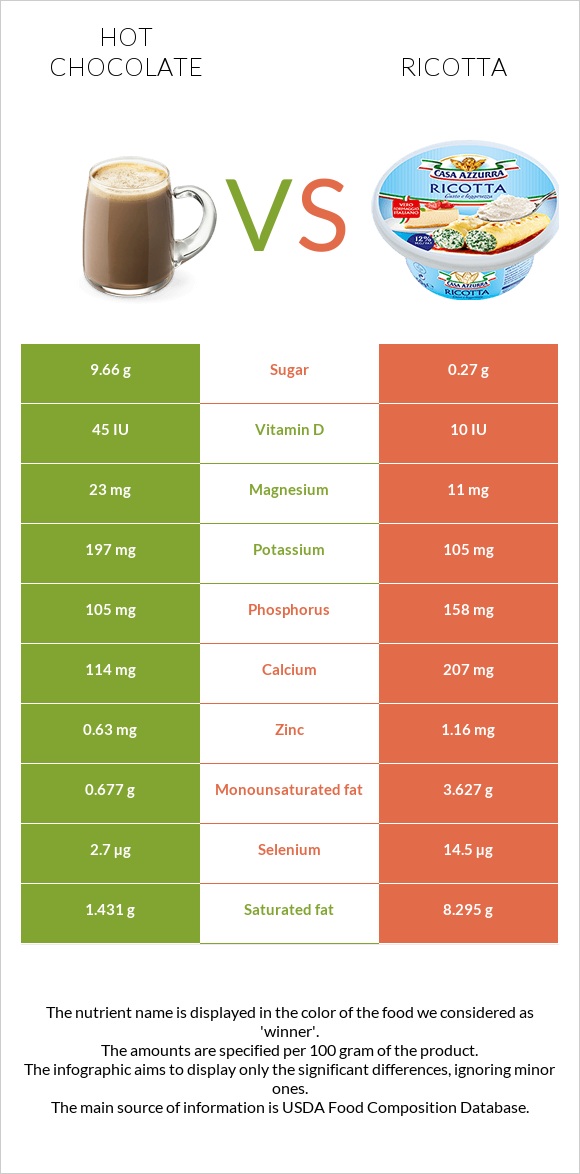Hot chocolate vs. Ricotta — In-Depth Nutrition Comparison
Compare
Differences between hot chocolate and ricotta
- Hot chocolate has more copper, vitamin B12, and vitamin D, while ricotta has more selenium, calcium, phosphorus, and vitamin A.
- Ricotta's daily need coverage for saturated fat is 34% higher.
- Ricotta contains 5 times less copper than hot chocolate. Hot chocolate contains 0.103mg of copper, while ricotta contains 0.021mg.
- The amount of saturated fat in hot chocolate is lower.
- Ricotta has a lower glycemic index. The glycemic index of ricotta is 27, while the glycemic index of hot chocolate is 51.
The food types used in this comparison are Milk, chocolate beverage, hot cocoa, homemade and Cheese, ricotta, whole milk.
Infographic

Infographic link
Mineral Comparison
Mineral comparison score is based on the number of minerals by which one or the other food is richer. The "coverage" charts below show how much of the daily needs can be covered by 300 grams of the food.
| Contains more MagnesiumMagnesium | +109.1% |
| Contains more PotassiumPotassium | +87.6% |
| Contains more CopperCopper | +390.5% |
| Contains less SodiumSodium | -47.6% |
| Contains more ManganeseManganese | +116.7% |
| Contains more CalciumCalcium | +81.6% |
| Contains more ZincZinc | +84.1% |
| Contains more PhosphorusPhosphorus | +50.5% |
| Contains more SeleniumSelenium | +437% |
Vitamin Comparison
Vitamin comparison score is based on the number of vitamins by which one or the other food is richer. The "coverage" charts below show how much of the daily needs can be covered by 300 grams of the food.
| Contains more Vitamin CVitamin C | +∞% |
| Contains more Vitamin DVitamin D | +450% |
| Contains more Vitamin B1Vitamin B1 | +200% |
| Contains more Vitamin B3Vitamin B3 | +27.9% |
| Contains more Vitamin B5Vitamin B5 | +54% |
| Contains more Vitamin B12Vitamin B12 | +44.1% |
| Contains more Vitamin AVitamin A | +135.3% |
| Contains more Vitamin EVitamin E | +266.7% |
| Contains more Vitamin KVitamin K | +450% |
| Contains more FolateFolate | +140% |
All nutrients comparison - raw data values
| Nutrient |  |
 |
DV% diff. |
| Saturated fat | 1.431g | 8.295g | 31% |
| Selenium | 2.7µg | 14.5µg | 21% |
| Fats | 2.34g | 12.98g | 16% |
| Protein | 3.52g | 11.26g | 15% |
| Cholesterol | 8mg | 51mg | 14% |
| Calcium | 114mg | 207mg | 9% |
| Copper | 0.103mg | 0.021mg | 9% |
| Phosphorus | 105mg | 158mg | 8% |
| Vitamin A | 51µg | 120µg | 8% |
| Monounsaturated fat | 0.677g | 3.627g | 7% |
| Vitamin B12 | 0.49µg | 0.34µg | 6% |
| Calories | 77kcal | 174kcal | 5% |
| Zinc | 0.63mg | 1.16mg | 5% |
| Vitamin D | 1.1µg | 0.2µg | 5% |
| Vitamin D | 45 IU | 10 IU | 4% |
| Fiber | 1g | 0g | 4% |
| Carbs | 10.74g | 3.04g | 3% |
| Magnesium | 23mg | 11mg | 3% |
| Potassium | 197mg | 105mg | 3% |
| Sodium | 44mg | 84mg | 2% |
| Vitamin B1 | 0.039mg | 0.013mg | 2% |
| Vitamin B5 | 0.328mg | 0.213mg | 2% |
| Folate | 5µg | 12µg | 2% |
| Polyunsaturated fat | 0.084g | 0.385g | 2% |
| Vitamin E | 0.03mg | 0.11mg | 1% |
| Vitamin B2 | 0.182mg | 0.195mg | 1% |
| Vitamin K | 0.2µg | 1.1µg | 1% |
| Caffeine | 2mg | 0mg | 1% |
| Vitamin C | 0.2mg | 0mg | 0% |
| Net carbs | 9.74g | 3.04g | N/A |
| Iron | 0.42mg | 0.38mg | 0% |
| Sugar | 9.66g | 0.27g | N/A |
| Manganese | 0.013mg | 0.006mg | 0% |
| Vitamin B3 | 0.133mg | 0.104mg | 0% |
| Vitamin B6 | 0.04mg | 0.043mg | 0% |
| Trans fat | 0.078g | N/A | |
| Choline | 15.6mg | 17.5mg | 0% |
| Tryptophan | 0.037mg | 0.125mg | 0% |
| Threonine | 0.095mg | 0.517mg | 0% |
| Isoleucine | 0.169mg | 0.589mg | 0% |
| Leucine | 0.305mg | 1.221mg | 0% |
| Lysine | 0.215mg | 1.338mg | 0% |
| Methionine | 0.076mg | 0.281mg | 0% |
| Phenylalanine | 0.15mg | 0.556mg | 0% |
| Valine | 0.201mg | 0.692mg | 0% |
| Histidine | 0.067mg | 0.459mg | 0% |
| Fructose | 0.01g | 0% |
Macronutrient Comparison
Macronutrient breakdown side-by-side comparison
Protein:
3.52 g
Fats:
2.34 g
Carbs:
10.74 g
Water:
82.45 g
Other:
0.95 g
Protein:
11.26 g
Fats:
12.98 g
Carbs:
3.04 g
Water:
71.7 g
Other:
1.02 g
| Contains more CarbsCarbs | +253.3% |
| Contains more WaterWater | +15% |
| Contains more ProteinProtein | +219.9% |
| Contains more FatsFats | +454.7% |
~equal in
Other
~1.02g
Fat Type Comparison
Fat type breakdown side-by-side comparison
Saturated fat:
Sat. Fat
1.431 g
Monounsaturated fat:
Mono. Fat
0.677 g
Polyunsaturated fat:
Poly. Fat
0.084 g
Saturated fat:
Sat. Fat
8.295 g
Monounsaturated fat:
Mono. Fat
3.627 g
Polyunsaturated fat:
Poly. Fat
0.385 g
| Contains less Sat. FatSaturated fat | -82.7% |
| Contains more Mono. FatMonounsaturated fat | +435.7% |
| Contains more Poly. FatPolyunsaturated fat | +358.3% |





